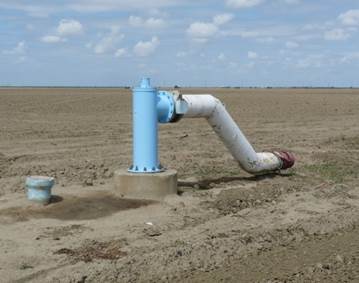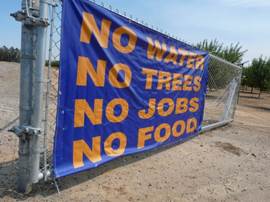
Westlands Water District, in western
Fresno County, severely impacted by
zero water deliveries.
Patrick Cavanaugh (California Ag Today Radio Network, Clovis, CA) reports on the California water woes. “Throughout the vast farming areas of California’s Sacramento and San Joaquin Valleys, intense concern and anxiety are growing over the lack of water for the critical irrigation of permanent crops such as almonds, walnuts, pistachios, tree fruit and citrus,” he said. Patrick speaks with farmers every day about what looks like a slow-moving crisis on the farm. California is in its fourth year of drought with the last two years being extremely tough on growers in many areas of California that depend on promised Federal surface water deliveries to their farms. Instead of flowing southward to help farms and cities, excess water is being diverted from the Sacramento Delta area to the Pacific Ocean to protect the Delta Smelt, a three-inch fish listed by the Endangered Species Act. “Low rain and snowfall last year triggered an unprecedented zero water allocation for nearly one-third of the productive farmland in the San Joaquin Valley, forcing growers to rely solely on groundwater pumping. And this year, on February 27, the Bureau of Reclamation repeated its tragic announcement—another zero surface water year,” he said. “In 2014, farmers were forced to fallow nearly one-half million acres of productive farmland on which they have grown tomatoes, garlic, melons, lettuce, and other nutritious crops.” Also last year, he said, “About $2.2 billion in crop revenue was lost, and more than 17,000 farmworkers lost their jobs. Food lines in troubled communities grow longer by the week. Yes, food lines,” Cavanaugh emphasized, “provide food for the dedicated farmworkers who have worked hard to harvest our food.” He noted that this calendar year is expected to be even worse.

the productive San Joaquin Valley.
Recently, Patrick spoke to David Jackson, who owns Family Tree Farms in Reedley, CA, southeast of Fresno. The operation farms a wide variety of tree fruit and blueberries. Jackson said, “Last year, in terms of quality, fruit and profitability, was among our best years. However, this year, there is no water in the system. There is no snowpack, no water in the reservoirs, and we have already depleted a lot of underground water. I just lost a million-dollar well in western Fresno County,” Jackson added. “Surface water, if it’s available, costs $2,000 an acre-foot. It takes four-acre-feet to produce a crop,” he said. “I’m three months out for a well driller to get to my farm to drill another well. The big question is: Can we save our trees or just let them go because it’s just not worth it?” Patrick concludes, “All farmers in Federal water districts will be making tough decisions this year. Should they push out part of their permanent crops and triage what water they muster-up to go to the higher production trees? The water year, which started in October 2014, certainly looked like the end of the drought. More than average rain and snow fell in November and December; however, January 2015 was the driest on record,” he explained. “More rain and snow came in February, but then a warm storm from the south melted much of the snow in the Sierra Nevada Mountain Range, which was so dry, the ground soaked it up instead of allowing the water to flow into streams and rivers. This alone is making 2015 the worst runoff year in California’s history. And the last hope for a miracle March of rain or snow yielded nothing,” he said.
